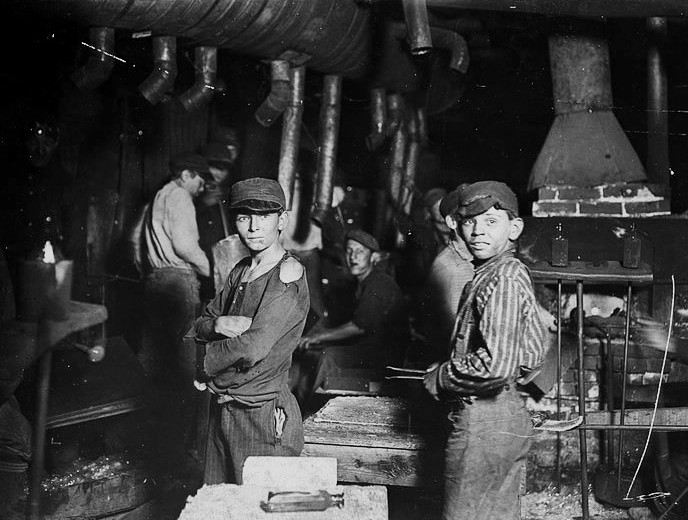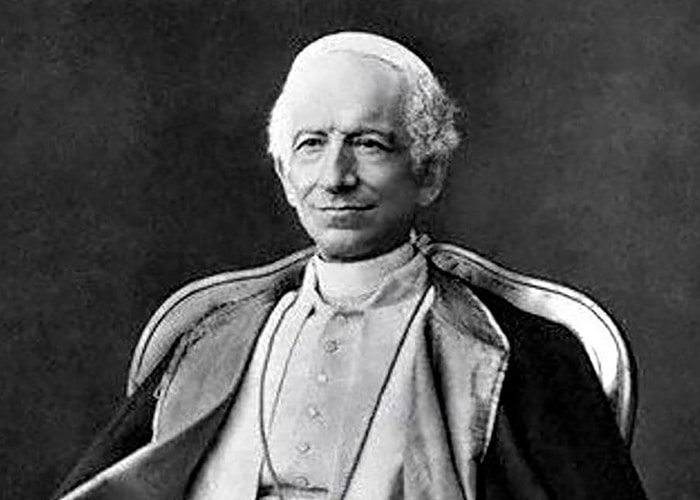What Is Catholic Social Teaching?
It is Not Liberal
It is Not Conservative
It is Charity
Origin of Catholic Social Teaching
Catholic social teaching emerged in the late nineteenth century when the world was in trouble. Radical changes were taking place in politics, economics and society. The Industrial Revolution was at its height. Major dislocations of pastoral people to squalid industrial centers disrupted the way of life millions had known for generations. Mass migrations from Europe were splitting families. The writings of Karl Marx had taken root in widespread communist movements. “A traditional society was passing away and another beginning to be formed – one which brought the hope of new freedoms but also the threat of new forms of injustice and servitude.” (Pope St. John Paul II, 4)


Origin of Catholic Social Teaching
Catholic social teaching has a long and rich history. It is both old, in that it presents timeless values, and new, as it constantly reflects the world around us – as it is.
Catholic social teaching emerged in the late nineteenth century when the world was in trouble. Radical changes were taking place in politics, economics and society. The Industrial Revolution was at its height. Major dislocations of pastoral people to squalid industrial centers disrupted the way of life millions had known for generations. Mass migrations from Europe were splitting families. The writings of Karl Marx had taken root in widespread communist movements. “A traditional society was passing away and another beginning to be formed – one which brought the hope of new freedoms but also the threat of new forms of injustice and servitude.” (Pope St. John Paul II, 4)

Rerum Novarum
At the height of this clash Pope Leo XIII interceded. In his landmark encyclical of 1891, Rerum Novarum, the Pope, and the Church with him, confronted a society torn by dispute and addressed it in pointed terms. This is where our story begins. We invite you to join us as we unfold this wonderful Church teaching – Catholic Social Doctrine.
Pope Leo XIII’s letter began the modern systematization of the Church’s reflection on social issues, which had been ongoing for millennia. In a sense the Pope’s letter claimed the Church’s “citizenship status”. The Church recognized her right and duty to address the changing realities of public life and to suggest genuine solutions. “In the face of a conflict which set man against man” Pope Leo XIII, for the first time, both established and firmly defended the Church’s moral authority to promote justice in public life and, by so doing, “created a lasting paradigm for the Church”. (Pope St. John Paul II, 5)
Pope Pius XI stated: “Leo’s Encyclical has proved itself the Magna Charta upon which all Christian activity in the social field ought to be based, as on a foundation.” (Quadragesimo Anno, 14)
Read more
In fact, this Church teaching is so important and comprehensive that Pope St. John Paul II called on lay Catholic leaders to form their consciences on the tenets of the Church’s social doctrine. (Ecclesia in America, 67)
Catholic social teaching has even “gradually and imperceptibly worked its way into the minds of those outside Catholic unity who do not recognize the authority of the Church. Catholic principles on the social question have as a result, passed little by little into the patrimony of all human society.” (Pope Pius XI, 21)
Catholic social teaching explores the three key principles (Human Dignity, Solidarity, Subsidiarity) underlying evaluation of all political, economic and cultural issues. Knowledge of these principles, in combination with our faith, provides the foundation to address current social questions.
Not Conservative or Liberal
Catholic social teaching is about principles not positions. It endorses neither side of a political argument because these principles (human dignity, solidarity, subsidiarity) are often lost in political wrangling over “positions”. By overlooking the principles of Catholic social teaching, governments fail to consider all aspects of policy decisions to the detriment of the common good.
Individuals of the right may latch on to the endorsement of free markets as an “important source of wealth and should be viewed carefully and favorably” (Pope St. John Paul II, 40) and draw great comfort from that fact – while forgetting about the evils of consumerism, improper business activities and the fact that their brothers and sisters are in dire economic straits.
Individuals of the left might focus primarily or only on the principle of solidarity and the Church’s endorsement of the “preferential option for the poor”. These are individuals who have been enamored of government responses to the social problems, ignoring the clear call of Catholic social teaching for free markets and Subsidiarity.
Most Importantly
– both sides often fail to implement Catholic social teaching through their lives. And both run the risk of forgetting a key message of Catholic social teaching: “It is clear that no economic, social or political project can replace the gift of self to another… He who does not give God gives too little”.
So, What Is Catholic Social Teaching?
To what end?
Read more
This is a critical point! As Pope Francis points out, apart from understanding Catholic social teaching “each individual becomes the criterion for measuring himself and his own actions…This leads to an effective lack of concern for others and…to human impoverishment and cultural aridity” where “we no longer have the capacity to build authentic human relationships”. (Address to the Council of Europe)

It Is Charity!
We must understand: to practice Catholic social teaching is charity.
“Charity is at the heart of the Church’s social doctrine.” (Pope Benedict XVI, 2)
Indeed, “To defend the truth, to articulate it with humility and conviction, and to bear witness to it in our life are…exacting and indispensable forms of charity”. (Pope Benedict XVI, 1)
The practice of Catholic social teaching “is the institutional path — we might also call it the political path — of charity, no less excellent and effective than the kind of charity which encounters the neighbor directly”. (Pope Benedict XVI, 7)
And, “We must participate in politics because politics is one of the highest forms of charity because it seeks the common good. And Christian lay people must work in politics.” (Pope Francis)
Read more
This has been clear for decades. Pope Pius XII told us, “The social program of the Catholic Church is based upon three powerful pillars: truth, justice and Christian charity.” (Pope Pius XII, Message to German Catholics, September 4, 1949)
Charity can be expressed in various ways: corporal works of mercy; spiritual works of mercy; or, implementing the tenets of Catholic social teaching in society. This inaccurate labeling (of corporal works of mercy as synonymous with the practice of Catholic social teaching) obscures our recognition that, in charity, we have a similarly binding requirement to confront improper and even sinful social structures – the domain of Catholic social teaching.
It Leads to Social Justice
This correct understanding of social justice was made clear by Pope Francis when he observed: “the duty of social justice… requires the realignment of relationships between stronger and weaker peoples in terms of greater fairness”; (World Day of Peace, 2014) it “upholds the fundamental human right to a dignified life”. (Meeting with Political, Economic, and Civil Leaders in Paraguay)
A hindrance thwarting both the knowledge and practice of Catholic social teaching is the confusion caused by diocesan, parish and university student programs and projects labeled ‘social justice’ — but which are often endeavors of corporal works of mercy.
Read more
By labeling projects to feed the hungry, clothe the naked and house the homeless “social justice” we inhibit our ability to distinguish between corporal works of mercy and the practice of Catholic social teaching thus obscuring our recognition that, in charity, we have a similarly binding requirement to confront improper and even sinful social structures – the domain of Catholic social teaching.


It Leads to Social Justice
Clothing runs, food drives, home building projects are corporal works of mercy, not social justice. Social justice, which is linked to the common good and the exercise of authority, results when “associations or individuals…obtain what is their due, according to their nature and their vocation.” (Catechism of the Catholic Church, 1928)
This correct understanding of social justice was made clear by Pope Francis when he observed: “the duty of social justice… requires the realignment of relationships between stronger and weaker peoples in terms of greater fairness”; (World Day of Peace, 2014) it “upholds the fundamental human right to a dignified life”. (Meeting with Political, Economic, and Civil Leaders in Paraguay)
A hindrance thwarting both the knowledge and practice of Catholic social teaching is the confusion caused by diocesan, parish and university student programs and projects labeled ‘social justice’ — but which are often endeavors of corporal works of mercy.
Read more
By labeling projects to feed the hungry, clothe the naked and house the homeless “social justice” we inhibit our ability to distinguish between corporal works of mercy and the practice of Catholic social teaching thus obscuring our recognition that, in charity, we have a similarly binding requirement to confront improper and even sinful social structures – the domain of Catholic social teaching.
The Major Themes of Catholic Social Teaching
The definition of Catholic social teaching involves a deeper look into certain major themes.
These are the ends the principles are working towards.
The Common Good
This concept represents “the sum total of social conditions which allow people, either as groups or as individuals, to reach their fulfillment more fully and more easily”. (Catechism of the Catholic Church, 1906)
Preferential Option for the Poor
Catholic social teaching insists a society is evaluated based on how it treats those who are most vulnerable. It “demands before all else an appreciation of the immense dignity of the poor”. (Pope Francis, 158) and an understanding of “who is poor”. I.e., it “extends not only to material poverty but also to the many forms of cultural and religious poverty.” (Catechism of the Catholic Church, 2444)
The Dignity of Work
How important is dignified work? “[T]he door to the dignity of a man is work.” (Pope Francis) “[W]ork is a key, probably the essential key, to the whole social question”. (Pope St. John Paul II, 3) “We were created with a vocation to work“. (Pope Francis, 128)
Universal Destination of Goods
This holds that “The goods of creation are destined for the entire human race” (Catechism of the Catholic Church, 2452) for “the sustenance of all its members, without excluding or favoring anyone.” (Pope St. John Paul II, 31)
Right to Private Property
Catholic social teaching points out that private property is closely entwined with the dignity of work and “The practice of all ages has consecrated the principle of private ownership”. (Pope Leo XIII, 11) This right must be protected by our social institutions.
Catholic Social Teaching addresses Society’s Structures and the Pathologies infecting them.
The Four Dangers to Society
The Church identifies four pathologies or major ‘risks and problems’ eating away at the cultural, economic, and political systems of the developed world and begins to identify how to cure them.
The Structures of Society
Pope St. John Paul II established the need to maintain vibrant and critical interaction among economics, culture, and politics; emphasizing that of these three – culture is the most important. (Centesimus Annus)
Conclusion
Based on the three key principles of Human Dignity, Solidarity, and Subsidiarity, the Catholic Church has done a lot of thinking and reflecting on macro societal issues:
- What form of government and economic system is best for promoting human freedom?
- Why must faith be part of the public square?
- What are the pathologies destroying our culture, and how do we fix them?
- How should we address the issues of developing countries?
- What are the dangers of a “welfare state”?
- Among many other vexing issues facing modern societies.
This website investigates these and many other questions and issues.
FAQs
Q: Changing the structures of society?
A: One way to express Catholic social teaching’s purpose is: To inform lay Catholic leaders’ consciences on how we are to interact with and impact upon the framework of society with the principles of Catholic social teaching – Human Dignity, Solidarity and Subsidiarity. Why? Because: “decisions which create a human environment can give rise to specific structures of sin which impede the full realization of those who are in any way oppressed by them”. (Pope St. John Paul II, 38)
There are structures of society that need to be destroyed. There are structures that need to be built. As Pope St. John Paul II said, “To destroy structures and replace them with more authentic forms of living in community is a task which demands courage and patience.” (Centesimus Annus, 38)
Q: Catholic social teaching is "charity"?
A: Let us recall that charity is a Theological virtue “infused by God into the souls of the faithful to make them capable of acting as his children and of meriting eternal life” (Catechism of the Catholic Church, 1813) and is required of everyone. It involves engaging, directly, those around us who are in need.
Charity can be expressed in three ways: corporal works of mercy; spiritual works of mercy, and; implementing the tenets of Catholic social teaching in society (in order to achieve the Common Good and Social Justice).
And, all three of these expressions are needed! The Church warns that social justice alone, without corporal and spiritual works of mercy, can result in a cold, legalistic public square: “When animated by [all forms of] charity, commitment to the common good has greater worth than a merely secular and political stand would have.” (Pope Benedict XVI, 7)
Q: Participating in “politics” is charity?
A: “Politics is an essential means of building human community and institutions” and, “political life can indeed become an outstanding form of charity.” (Pope Francis)
“To work for the common good is a Christian duty, and many times the way in which to work towards it is through politics.” (Pope Francis)
“[T]o take politics seriously at its different levels – local, regional, national and worldwide – is to affirm the duty of each individual to acknowledge the reality and value of the freedom offered him”. (Pope Saint Paul VI)
So, “[w]e must participate in politics because politics is one of the highest forms of charity…Christian lay people must work in politics.” (Pope Francis)
Pope Francis also recognizes that this “is not easy; politics has become too tainted. But I ask myself: Why has it become tainted? Because Christians have not participated in politics with an evangelical spirit? …To work for the common good is a Christian duty, and many times the way in which to work towards it is through politics.” (Pope Francis)
On a practical level, in democratic societies a key way every Catholic can accomplish this obligation to practice charity is through voting.
Q: Why is labeling corporal works of mercy as "social justice" a problem?
A: The confusion of viewing corporal work of mercy as synonymous with practicing Catholic social teaching complicates the realization of our binding requirement to practice Catholic social teaching in our ‘public lives’ (at work and at the voting booth).
Pope St. John Paul II was clear that proper formation with Catholic social teaching “will act as the best antidote to the not infrequent cases of inconsistency and even corruption marking socio-political structures.”
Conversely, he was just as clear that if this requirement to know and practice Catholic social teaching “is neglected, it should not come as a surprise that many…will be guided by criteria alien to the Gospel and at times openly contrary to it.” (Ecclesia in America, 67)
What we call things matters.
Q: Is practicing Catholic social teaching a requirement?
A: Yes. Catholics must live out their faith in the Public Square, for the betterment of all.
“[E]very Christian is called to practice charity in a manner corresponding to his vocation and according to the degree of influence he wields”. (Pope Benedict XVI, 7) This is binding – a “requirement” of lay spirituality – of living out our lives in the world.
Practicing Catholic social teaching is not an option. We are being called to “an exacting and indispensable form of charity” (Pope Benedict XVI, 1) thus grounding us in faith in the risen Christ as the basis of Catholic social teaching.
“In reality, social instruction ‘incarnates’ the faithful in society. It places a duty upon Christians to give flesh to his or her faith”. (Paul Cardinal Cordes, Not Without the Light of Faith: Catholic Social Doctrine, speech at The Australian Catholic University, November 27, 2009)
Q: Is the Church limiting the state’s ability to effect needed changes and numerous goods?
A: Not at all! In fact, it is by recognizing subsidiarity that the state is, itself, justified: i.e., “will more freely, powerfully, and effectively do all those things that belong to it alone because it alone can do them”. (Pope Pius XI, 80) Subsidiarity, properly understood, both justifies and sets limits on the activities of the state.
Subsidiarity “is always designed to achieve…emancipation because it fosters freedom and participation through assumption of responsibility. Subsidiarity respects personal dignity by recognizing in the person a subject who is always capable of giving something to others.” (Pope Benedict XVI, 57) Subsidiarity ensures society is organized towards its proper ends. “Not only is it wrong from the ethical point of view to disregard human nature, which is made for freedom, but in practice it is impossible to do so. Where society is so organized as to reduce arbitrarily or even suppress the sphere in which freedom is legitimately exercised, the result is that the life of society becomes progressively disorganized and goes into decline.” (Pope St. John Paul II, 25)
Pope St. John Paul II pointed out subsidiarity is critical because it “insists on necessary limits to the State’s intervention…inasmuch as the individual, the family and society are prior to the state and inasmuch as the State exists in order to protect their rights and not stifle them”. (Centesimus Annus, 11)
The principle of subsidiarity lies at the heart of a stable social order by fostering the personal responsibility that naturally accompanies individual liberty – ensuring that personal interest is not placed in opposition to societal interests – and by seeking to bring individual desires and the demands of the common good into fruitful harmony.





